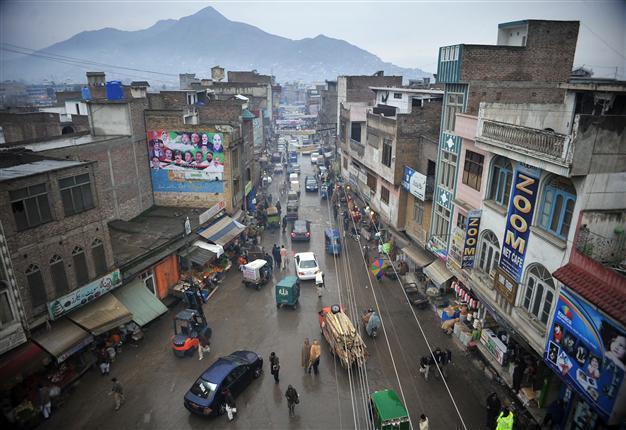Suicide bomber kills 19 at Pakistan mosques
PESHAWAR, Pakistan - Agence France-Presse

AFP Photo
A suicide bomber targeted a Shiite Muslim mosque in northwest Pakistan on Friday, killing 19 people and wounding dozens as worshippers poured out of weekly prayers, officials said.The bomber detonated explosives packed into a motorcycle in a narrow lane containing both the Shiite and a Sunni Muslim mosque in the town of Hangu, the latest bloody sectarian attack in a country where such violence is on the rise.
"It was a suicide attack which targeted Shiites but Sunni Muslims also fell victim since their mosque and some shops were also very close to the site," district police chief Mian Muhammad Saeed told AFP.
"We have found the head of the bomber, who came there on a motorbike," he said, putting the death toll at 19 with 33 others wounded.
Police said the bomb exploded as Shiites were leaving Friday prayers and Sunnis were going into their mosque for the main weekly sermon.
Hangu has long been a flashpoint for violence against minority Shiites, who make up an estimated 20 percent of Pakistan's population of 180 million.
It is close to Pakistan's semi-autonomous tribal belt on the Afghan border where Taliban and Al-Qaeda-linked militants have carved out strongholds.
"The Shiite and Sunni mosques are very close to each other, and the explosion took place just as Shiites were coming out of the mosque and Sunnis were going into their mosque to say Friday prayers," said police official Imtiaz Shah.
There was no immediate claim of responsibility.
On January 10, a twin suicide attack killed 92 Shiites from the Hazara ethnic community in the southwestern city of Quetta -- the worst single attack on Shiites in Pakistan.
Lashkar-e-Jhangvi, Pakistan's most extreme Sunni terror group, claimed responsibility for the attack.
It is linked to both Al-Qaeda and the Pakistani Taliban, Sunni fundamentalists who have fought an insurgency against the government since 2007.
Human Rights Watch (HRW) says it documented a sharp escalation in persecution of religious minorities in Pakistan in 2012, which it called the deadliest year on record for Shiites, with well over 400 killed in targeted attacks.
Activists accuse the government of failing to protect Shiites and say the perpetrators operate with impunity because the judiciary fails to prosecute them.
"Pakistan's human rights crisis worsened markedly in 2012 with religious minorities bearing the brunt of killings and repression," said Ali Dayan Hasan, Pakistan director at HRW, said in the group's annual report.
"The government needs to show some backbone and act urgently to protect vulnerable communities such as the Hazara, or risk appearing indifferent or even complicit in the mass killing of its own citizens," he added.
















